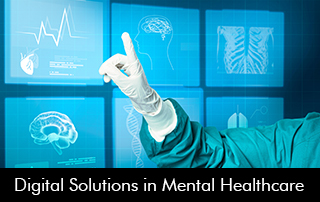Digital technology solutions like mental health smartphone apps, digital clinics, and telehealth virtual visits are transforming and revolutionizing remote health to enhance access to mental health care. In the world, one in two people has mental health issues that impact their social, personal, and work-life and later hurt the economy and the environment.
Mental Healthcare in the US
There is a crisis in mental healthcare in the United States. Sixty percent of young people with depression disorders didn’t receive any treatment from 2017 to 2018. In the States, there is also a shortage of psychiatrists and mental healthcare providers.
Due to the COVID-19 pandemic, more and more people were dealing with depression and anxiety due to irregular incomes, disconnection with loved ones, and self-isolation. Digital tools and technologies have played a very important role to make mental health providers reach their patients remotely to help diagnose and treat their conditions promptly. Digital solutions have improved access to care for larger populations.
Through digital technologies, mental health patients can get
- Greater choice
- Increased flexibility
- Rapid access to high-quality care
- Greater access to information and services
Robust digital solutions for mental healthcare
Telemedicine Platform
Telemedicine EMR software is seen as an effective platform by patients and psychiatrists to treat mental health conditions. Virtual sessions help patients to have comfortable one-on-one talks with their care provider. This has also helped to battle the stigma of receiving mental health care in America and many parts of the world. Timely communication with a psychologist is key to avoiding stress and anxiety in the future. The 24 hours a day availability to connect with the provider have empowered patients. The earlier detection of problems and shared-decision making through telehealth therapy has made it a preferred platform for mental health patients. A 2020 Veterans Administration Study revealed that video telepsychotherapy is seen as effective as in-person visits to treat depression and PTSD in patients.
Mental health apps
Mental health smartphone apps have recently gained a lot of popularity because it’s a solution in the palm of the patient. These apps usually include a symptom tracker, appointment and medication reminders, and motivational prompts. These apps are safe and user-friendly to use by patients who want a positive impact on their overall well-being.
Challenges to digital solutions
The apparent challenge for digital tools is the privacy and security of sensitive patient data that will be shared between providers and clinicians. Data sharing opportunities should be protected and encrypted via HIPAA compliance or the use of Blockchain technology to gain the trust of patients.
The future of digital options for mental healthcare
Technological innovations have proved to lay a positive foundation in the mental health sector. Through digital tools and devices, the communication barriers can be lifted, and patients can quickly connect with their mental health provider to monitor mental issues on time. In a world where people are dealing with a relationship crisis, disturbed parent-child relationships, broken families, unemployment, and the youth getting into drugs digital solutions are required to increase access to mental health care patients to larger population groups for healthy and happier people.







